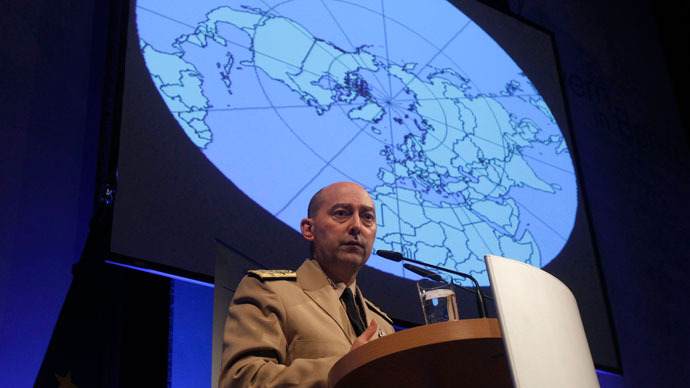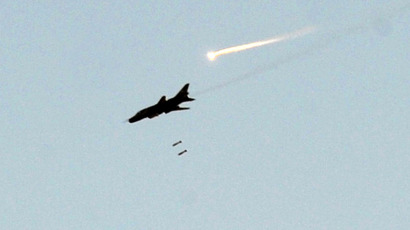NATO nurturing Syria contingency plan - top US commander

NATO forces are focusing on a “wide range of operations” in Syria, the US top commander in Europe told the US Senate. If called upon, the international coalition is ready to engage on the same level and in same way as it did in Libya.
Speaking to the Senate’s Armed Services Committee, Commander of
the US European Command (USEUCOM) Admiral James Stavridis told
lawmakers that NATO's member governments were currently discussing
“a variety of operations.”
He said the alliance has taken the position that it will follow the
same sequence used in Libya. “We are prepared, if called upon,
to be engaged as we were in Libya,” the 58-year-old admiral
assured the country's political elites.
It means that prior to the NATO involvement there would first be a
resolution at the UN Security Council, a regional agreement and
consensus among the 28 NATO member states.
Two years of fierce fighting between the Syrian army and the
foreign-backed insurgency have been marked by the failure of either
side to fully win. The bitter results of Syria's civil war are
well-known in Washington.
“The Syrian situation continues to become worse and worse and
worse: 70,000 killed, a million refugees pushed out of the country,
probably two and a half million internally displaced. No end in
sight to the vicious civil war,” Stavridis told the Senate’s
Committee.
In Washington's eyes, the shortest way to end the bloody is to get
rid of the government of President Bashar Assad. Helping to oust
Assad could be done simultaneously in several directions: by
imposing a no-fly zone along the Turkish-Syrian border with the
help of NATO’s Patriot PAC-3 air defense complexes recently
deployed there and by supplying rebels with arms or by ensuring an
arms embargo on Damascus.
Shooting down Syrian aircraft in that zone would become a
“powerful disincentive” to keep Syrian Air Force pilots out
of the area, Stavridis promised Arizona Senator John McCain.
In addition to that, Armed Services Chairman Carl Levin got a
positive answer to his question as to whether the US military is
considering targeting Syrian air defenses.
Diplomacy with no teeth
While the Kremlin insists on a diplomatic solution to the bloody
conflict, the Obama administration does not believe the conflict
can be resolved by diplomats.
“It's hard to imagine a peaceful outcome with Assad in
power,” stated Anne Richard, the assistant secretary of state
for Population, Refugees, and Migration, speaking at another
Capitol Hill hearing on Syria.
Meanwhile, the fact that one million refugees have fled Syria -
half of them in the last two months - has significantly affected
the country's neighbors. Up to 10 per cent of the Lebanese
population now consist of Syrian refugees. People are also fleeing
to refugee camps in Jordan and Turkey.
With no end in sight, the conflict is pushing members of the US
Senate to take action - by helping the Syrian insurgency.
Expanding sanctions against the Central Bank of Syria has always
been within the powers of the American legislatures. Yet other
steps imply direct meddling into Syria’s internal affairs.
Senators Bob Casey and Marco Rubio advocate non-lethal aid to
Syrian opposition groups. The move, supported by both Democrats and
Republicans, would mean providing the rebels with body armor and
communications equipment.
Still, the option of simply arming the rebels is also on the
table.
“Down the road we may make another determination,” Casey
acknowledged.
On Monday, Congressman Eliot Engel presented legislation enabling
the US to train Syrian opposition groups.














